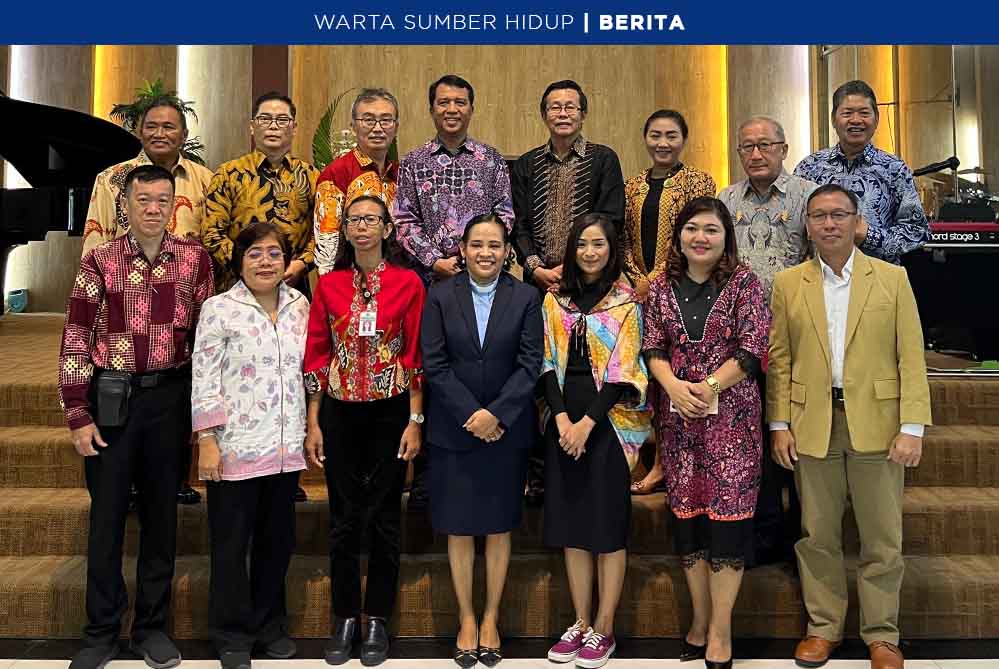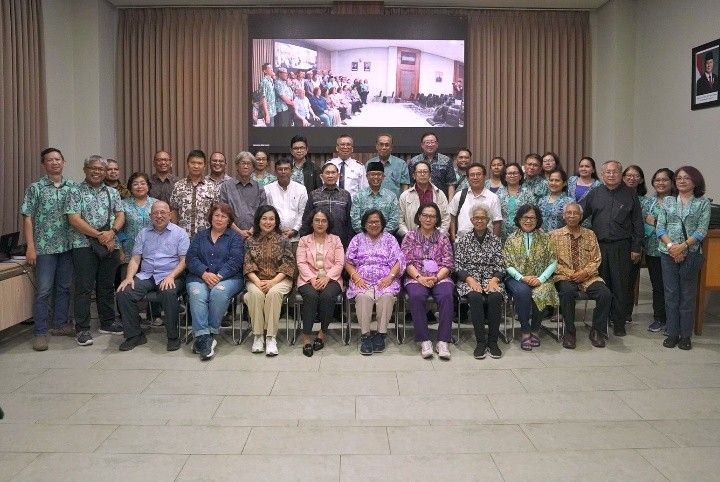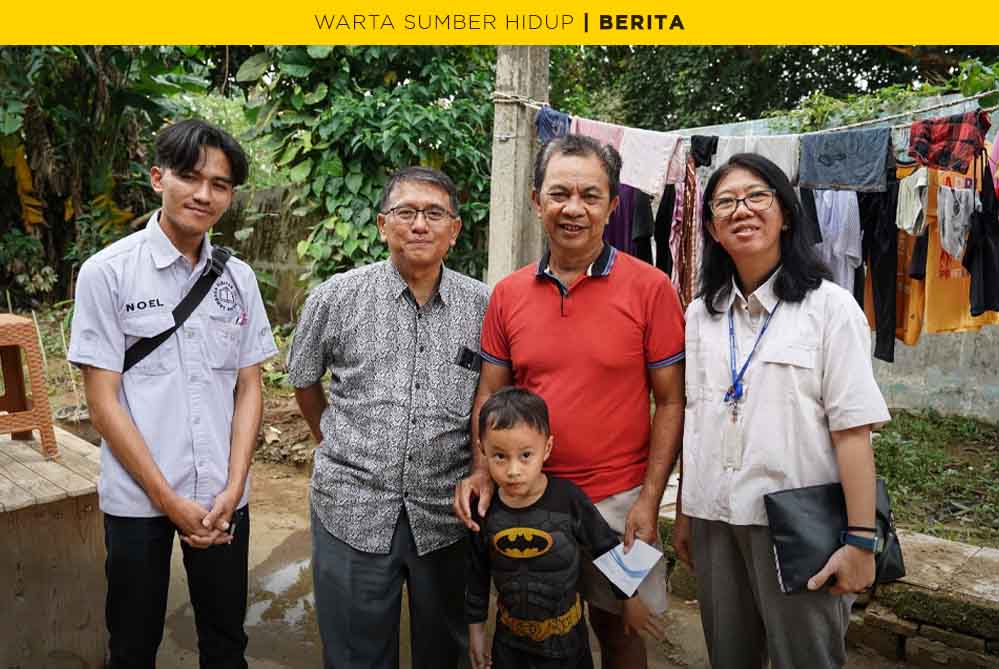The second day of the Indonesian Bible Institute (LAI) Foundation Organ Retreat and Work Meeting on June 10, 2025 began with a solemn and profound worship service. The service provided a contemplative atmosphere that allowed each participant to immerse themselves in God's presence through silence, repetitive chanting, and communal prayer. Taiz's ecumenical approach to worship symbolized spiritual openness and unity, which was very relevant to the theme of the event: "Together in Mission, Strong in Synergy based on Biblical Spirituality (Proverbs 8)".
.
Discussion Session I: "The Mission of Scripture in the Context of Religious and Cultural Diversity"
The first session opened with an in-depth discussion on the theme "The Mission of Scripture in the Context of Religious and Cultural Diversity", presented by Rev. Paulus Wijono, S.Th., MM, Chairman of the West Java PGIW and in the LAI Foundation Organ sits as a Supervisor.
In his presentation, Rev. Paulus emphasized the fact that although West Java is known as a region with vibrant religious dynamics, interfaith coordination and cooperation has not been optimal. Data from official government agencies and survey institutions show that religious tolerance in West Java still faces significant challenges, especially in terms of interfaith communication that is not yet intense and structured.
According to him, the task of promoting tolerance cannot only be imposed on religious institutions, but must involve community leaders, local bureaucracy, and grassroots communities. Strong social leadership is needed as a bridge between existing differences and the spiritual mission to build harmony. Furthermore, Rev. Paulus said that a correct and deep understanding of the Bible from the congregation plays an important role in strengthening faith and encouraging a positive attitude to life. The church, according to him, must be present not only as a place of worship, but as an agent of social change that prioritizes the values of love and justice sourced from the Holy Scriptures.
The Rev. Bambang Widjaja, added his perspective on the importance of approaching the Bible in a local context. He mentioned that the Bible in Sundanese could be a powerful medium to reach out to congregations in the West Java region, especially in a situation where tolerance has not progressed significantly. However, Rev. Paulus responded realistically. He revealed that many members of the GKP (Pasundan Christian Church) congregation are not native Sundanese, due to mixed marriages and inter-regional migration. As a result, the use of Sundanese Bibles is limited.
“ In GKP Bandung, for example, Sundanese worship is only held once a month. The congregation that attends is generally elderly. There are also fewer and fewer pastors who are able to preach in Sundanese," he explained.
This situation reflects the challenge of the continued use of local languages, especially in spiritual services. Rev. Paulus also highlighted that some mission agencies use Sundanese for initial evangelistic activities, but afterwards no longer accompany the congregation as a whole. This results in a sense of spiritual abandonment and an appreciation of the Bible that slowly loses its sacred meaning for some congregations.
Romo Subagyo also shared his experience of creative and impactful interfaith practices. He said that in several Catholic churches in Semarang, Bible reading activities are carried out with people of other religions, where each representative reads the Bible in their own way.
“The important thing is not the form of the event, but the spirit of tolerance that is the breath of the activity,” he said.
According to Father Subagyo, initiatives like this can be a collaborative model that should be tried in areas like West Java. Communication is the main key, so that differences do not become a wall of separation, but instead become a unifying bridge that enriches common spirituality.
Dr. Irene Setiadi closed the first discussion session by conveying the importance of a humane approach in realizing tolerance, such as through cooperation in handling natural disasters or humanitarian assistance.
“This approach can be a way to nurture the ecumenical spirit and high tolerance, ” she explained.
He also emphasized the importance of respecting the local church, understanding the customs of the congregation, and being present by providing what is truly needed. According to him, the church is not just a place to gather, but a center of community strengthening that has an impact on social life at large.
Discussion Session II: Challenges and Opportunities for Local Language Bible Translation
The second session highlighted a more technical yet highly strategic theme: Challenges and Opportunities of Local Language Bible Translation in Indonesia and Asia, led by Rev. Dr. Anwar Tjen, an important figure in the field of Bible translation.
He revealed astonishing data: out of 781 local languages in Indonesia, 522 languages have been categorized as endangered, and 15 languages are already completely extinct.
“ Local languages are our wealth that is closest to our identity. Approaching the Bible in the mother tongue touches the heart personally and existentially," said Rev. Anwar.
He emphasized that the translation of the Word of God into local languages is not just a linguistic project, but a form of respect for diversity and local wisdom. The Bible in the mother tongue makes the congregation feel directly addressed by God.
Pdt. Bambang Widjaja again gave his views, this time with a critique of translation practices by other institutions. He regretted that some organizations only make Bible translation as a short-term business project that depends on donations from businessmen.
“The end result is not for service, but for profit. Such translations tend to be quick but not in-depth," he emphasized.
In his opinion, this threatens the quality and sacredness of the text. LAI, as an institution trusted by churches in Indonesia, rejects such an instant approach. It insists that translation standards must be maintained through collaboration with local institutions that understand the cultural and linguistic context.
The Rev. Anwar Tjen agreed with this statement. He added that the temptation of big funds from outside is one of the biggest temptations in translation today. However, LAI still maintains integrity and tradition in translation, because this is the Word of God, not just a plain text.
The Rev. Gomar Gultom, Chairman of PGI, also emphasized that churches in Indonesia use the Bible published by LAI, and this must continue to be socialized so that there is no confusion among congregations.
The Rev. Yosafat Mesach also made a strategic suggestion that the LAI should be more active in approaching other church bodies to explain the translation process. This is important to increase transparency and build mutual trust.
The discussion was closed by Rev. Anwar Tjen with the affirmation that LAI remains open to translation needs, but quality and integrity must be maintained. He added that the church is not the final arbiter of translation, but rather a partner in dialogue for the sake of presenting a true, beautiful, and responsible Bible.
Cultural Recognition: Visit to Saung Angklung Udjo
As part of the retreat and introduction to the local context, participants were invited to visit Saung Angklung Udjo, a famous Sundanese cultural arts center in Bandung. In this place, participants were invited to watch an angklung music performance that is full of meaning of togetherness and unity.
The performance not only featured traditional music, but also illustrated the Sundanese philosophy of life full of hospitality, mutual cooperation, and respect for diversity. All of these values are in line with LAI's spirit of presenting the Bible in the context of local culture.
Visit to NuArt Sculpture Park
Afterwards, participants continued their activities with a visit to NuArt Sculpture Park, a contemporary art park founded by artist Nyoman Nuarta. Located in the Setraduta area of Bandung, the park features a variety of monumental sculptural works that blend with the natural environment.
NuArt is not just a place for art exhibitions, but also a space for education and cultural reflection. It includes galleries, amphitheaters, and creative studios that serve as a space for dialogue between art, spirituality, and diversity.
Participants are invited to see how art can be a medium to voice human values and unity, which is very relevant to LAI's mission of promoting a contextual approach to the Word of God.
The whole series of the second day was closed with a dinner together, which was warm and full of intimacy. This relaxed atmosphere provided a platform for participants from various church backgrounds, cultures, and professions to interact personally and strengthen synergy networks.
In this joyful atmosphere, the participants returned to Bumi Silih Asih, Diocese of Bandung, with strengthened hearts and expanded minds. The reflections of the day showed that the mission of LAI is not only about the text, but also the relationships, culture, and spirituality that live in the community.
The second day of the LAI Foundation Organ Meeting and Retreat emphasized that the mission of Scripture must be carried out with awareness of the cultural context and religious diversity in Indonesia. Interfaith approaches, regional languages, and translation strategies are key in answering the challenges of the times. This activity also shows that Bible ministry is not an exclusive work, but a collaborative call that requires the participation of all elements of the church and society.
In the midst of a changing world, LAI continues to stand firm, maintaining the quality of translations, expanding cross-institutional synergies, and presenting the living Word of God. Not only in words, but also in deeds of love and brotherhood.























